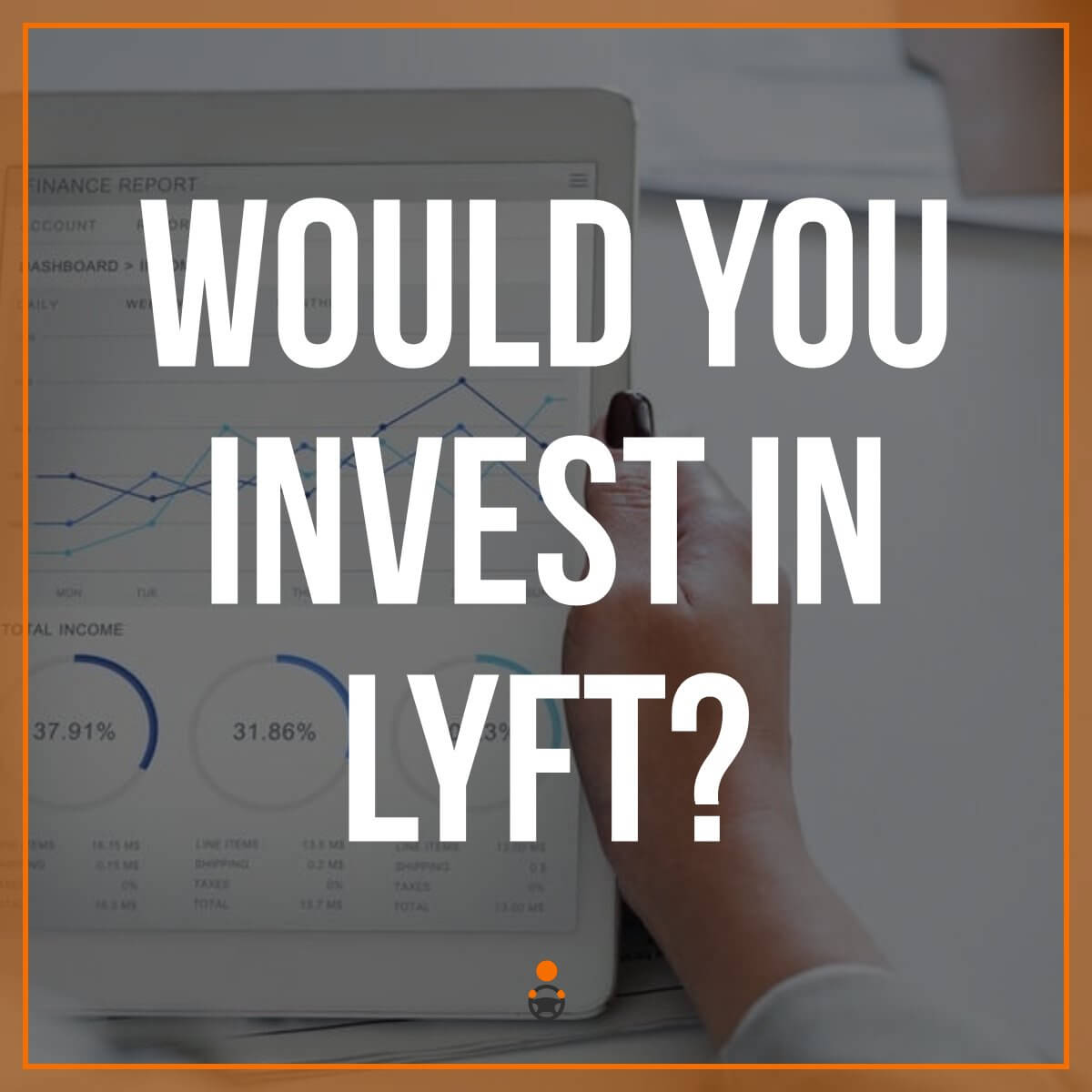Would you invest in Lyft if you could? Today, senior RSG contributor John Ince tackles this question, including how you might invest in Lyft, and why you should (or shouldn’t) invest in Lyft, if you had the opportunity.
Lyft is currently valued at around $15.1 billion. Clearly, it’s pretty difficult if not impossible for the average rideshare driver to invest in Lyft – for now. Until Lyft goes public on the stock exchange, drivers won’t easily be able to “invest” in Lyft. However, it’s interesting to think about if you could invest in Lyft, would you really want to? A secondary market, called EquityZen, recently offered shares of Lyft for sale, so I decided to look at how investing in Lyft would work and why, if at all, it would be worthwhile to invest in Lyft (hypothetically, of course).
By the way, we’ve noticed that Lyft is an extremely popular investment on EquityZen and it rarely becomes ‘available for investment’ but when it does, it’s gone in a matter of minutes.
So You Want to Invest in Lyft (Potentially)
Essentially, EquityZen is a marketplace to match willing buyers and sellers of shares of stock in pre-IPO, privately held companies. If you happen to work for Lyft and have been receiving part of your compensation in equity, they EquityZen is an option for you to sell your shares of Lyft.
But does buying shares in Lyft make sense for you or for me? Before you answer, you should know that you need to be an accredit investor and have at least $20,000 just to get a seat at the table. If you fulfill all those requirements, then we can move to the question of whether or not you (or I) would invest in Lyft.
Investing using EquityZen is pretty straightforward, if you qualify. On their site, you can see a list of companies that you could invest in (if they are accepting new investment – you can see in the screenshot below, some companies are waitlisted):
Once you’ve identified the company you want to invest with (in this case, Lyft), you’ll be taken to a page that provides you more information on your investment, including the minimum investment you must make (in this case, $20,000).
Investing is always a personal decision. At the right price, of course I would. But the price they’re offering shares would have to be a lot less than it is now. Currently, Lyft is valued north of $15billion, which is too high for me at least. This investment opportunity is riddled with risks, especially investing through a secondary market like EquityZen.
Why is Investing Through Secondary Markets Risky?
Long ago in Silicon Valley, there were only two ways you could invest – you could invest in a publicly traded company on markets like NASDAQ or you could invest in the company before it went public, usually on behalf of a VC fund. The latter involved much more risk because there was no market to calibrate prices. Prices were set only through exchanges between private parties.
Then along came secondary markets like EquityZen and the investing boundaries started to break down. This came with additional risks. Smaller markets are less precise. Market manipulation is more likely. What’s to prevent wired in investors from intentionally manipulating prices on secondary markets by artificially inflating the value of their shares, by selling (or buying) shares with another private individual at some price they both deem fair?
If very few shares are being traded, the potential for market manipulation is greater. The incentives are there. If one party already owns shares of, say, Lyft, the value of their existing shares would be increased simply by setting a new market price with a new purchase.
This is what happened in the Uber sale to Softbank. Some shares, from investors, were bought at one price. Then Softbank jacked up the share price of what they bought directly from Uber at a higher price – just to keep Uber’s valuation at about $70 billion. Softbank had its cake and ate it, too.
Now with Equity Zen, you have small investors buying into Lyft who are essentially defenseless against the big players who might use their buying power to manipulate the price. The due diligence done by the equity crowdfunding manager is nowhere near as thorough as the analysis done by investment professionals in an IPO.
If you catch the right wave and ride it, you might find the value of shares bought through EquityZen appreciate significantly, so high risk/high reward potential.
With all that as qualification, here is the view of this game from my seat up in the bleachers:
10 Reasons To Invest in Lyft
- The Strength of Lyft’s brand: While it might be a stretch to call the Lyft brand strong relative to Uber, it’s certainly stronger than it was a few years ago, what with Uber having been pummeled in the media for years.
- Partnerships: Lyft continues to build a strong ecosystem of partnerships, with General Motors being their major one. In general, Lyft seems more adept at forging workable partnerships than Uber.
- Strong Investor Base: Lyft’s existing investor base is an impressive who’s who of Silicon Valley from Andreessen Horowitz on the West Coast, to GM in the midwest, to Carl Icahn in New York.
- Boomerang Effect: Every time Uber messes up, Lyft, by extension, benefits. Whenever Uber is in the news for something bad, Lyft is inevitably mentioned as well (usually not doing something bad).
- The Lyft App is Comparable to Uber: The Lyft driver app and driver base is comparable if not nearly indistinguishable from Uber.
- Customer Loyalty: Lyft’s customer base is loyal, if not passionate, about the service.
- More Bang for the Buck: You get more bang for your buck by investing in Lyft than Uber. Uber is a more mature and bigger company, so your dollars don’t buy you as much as the same amount would get you at Lyft.
- No Overseas Loss Leaders: Lyft doesn’t have the financial burden of overseas loss leaders, although their recent move into Canada might foreshadow more moves abroad.
- Better Culture: Lyft has a more positive corporate culture and a more stable executive team then Uber.
- Less Legal Uncertainty: Lyft has already successfully settled (and paid out) the California lawsuit regarding independent contractor status.
5 Reasons to Not Invest in Lyft
- Driverless Cars Not Coming Soon Enough: Driverless cars are not going to be a significant factor in the ridesharing market for a long time – perhaps over a decade. Bill Gurley of Benchmark Capital, (which recently sold shares to Softbank) said at the Launch Festival in San Francisco that he doesn’t see driverless cars being commercially viable for at least 20 years.
- Unsustainable Business Model: Whether you’re Uber or Lyft, you’re basically operating in a market that has an unsustainable business model and passengers now have unrealistic expectations regarding the reasonable price for the service that’s offered.
- It’s a Messy Business: Ridesharing is a messy business with all kinds of conflict and potential for public relations disasters (see the news about Uber and sexual assault).
- What Happens When the Recession Comes: We’re now living in the 10th year of an economic expansion, and yet Lyft and Uber are losing money at an astonishing rate. If they can’t make money during good economic times, what’s going to happen when the economy starts tanking?
- Legal Uncertainty: Legal questions hang over the entire industry, especially with the most recent ruling in California that drivers must be treated as employees. That’s a ruling that could fundamentally change the economics of the business; good news for drivers, bad news for Uber and Lyft.
So Should You Invest in Lyft?
Privately held companies can release as much or as little about their performance as they wish. The less you know about a company’s financials, the greater the risk. Everyone has a different tolerance for risk, and a different level of disposable assets that they can afford to lose altogether.
Make no mistake about it: Lyft is a risky investment – even more risky than Uber. What makes Lyft especially risky is the nature of its assets. Although it has invested billions in building their network and their brand, they have very few tangible assets to show for it. They have some intellectual property, maybe a few patents, some trademarks and brand awareness, but if Lyft’s money ran out, and they had to start scaling back operations and laying off employees, there’s just not much that’s salvageable from Lyft.
The drivers own their own cars. The passengers can find other modes of transportation – even public transit. They use Lyft (and Uber) because it’s a faster, cheaper alternative. But that’s the real hazard of investing in both Lyft and Uber – the industry has yet to demonstrate they have a viable business model. Rideshare companies have demonstrated they can grow if they offer rides at subsidized fares, but no one is certain how much demand will fall if they raise fares to market rates, which eventually they must do.
Bottom line: I just don’t think this industry is going to have a happy ending. I would not invest in Lyft or Uber at current offering prices. The industry was overhyped in the press and the outlook for these companies, I’m afraid, is going to get worse, not better.
Readers, what do you think about this analysis of investing in Lyft? Do you think this is a fair assessment, or are there things John has not considered that could change the calculation of investing in ridesharing companies?
-John @ RSG






